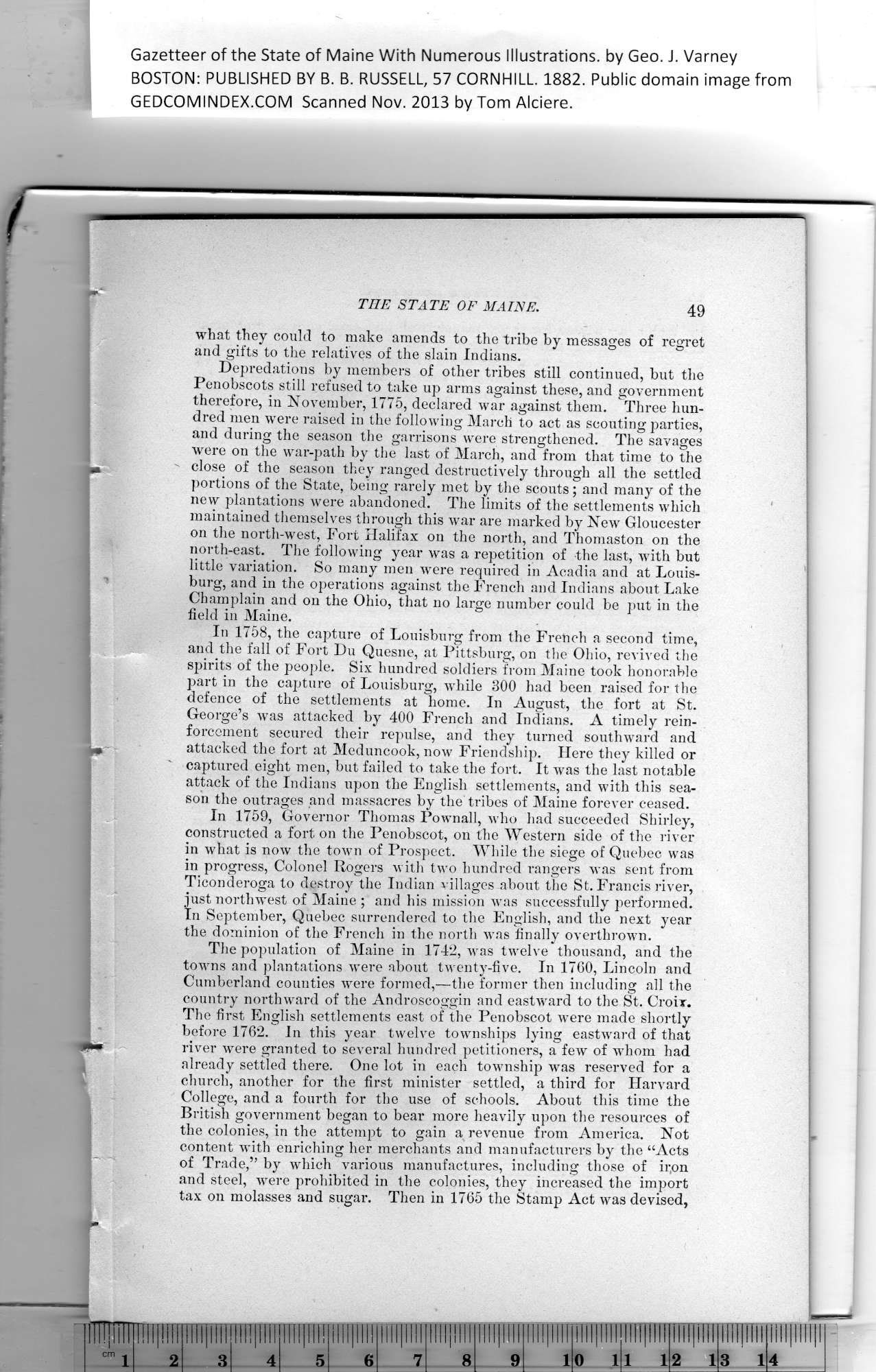|
Gazetteer of the State of Maine With Numerous Illustrations, by Geo. J. Varney
BOSTON: PUBLISHED BY B. B. RUSSELL, 57 CORNHILL. 1882. Public domain image from
THE STATE OF MAINE. 49
what they could to make amends to the tribe by messages of regret
and gifts to the relatives of the slain Indians.
Depredations by members of other tribes still continued, but the
Penobscots still refused to take up arms against these, and government
therefore, in November, 1775, declared war against them. Three hun-
dred men were raised in the following March to act as scouting parties,
and during the season the garrisons were strengthened. The savages
were on the war-path by the last of March, and from that time to the
^ close of the season they ranged destructively through all the settled
portions of the State, being rarely met by the scouts; and many of the
new plantations Avere abandoned. The limits of the settlements which
maintained themselves through this war are marked by New Gloucester
on the north-west, Fort Halifax on the north, and Thomaston on the
north-east. The following year was a repetition of the last, with but
little variation. So many men were required in Acadia and at Louis-
burg, and in the operations against the French and Indians about Lake
Champlain and on the Ohio, that no large number could be put in the
field in Maine.
In 1758, the cajDture of Louisburg from the French a second time,
and the fall of Fort Du Quesne, at Pittsburg, on the Ohio, reA'ived the
spirits of the people. Six hundred soldiers from Maine took honorable
part in the capture of Louisburg, AAdiile 300 had been raised for the
defence of the settlements at home. In August, the fort at St.
George’s Avas attacked by 400 French and Indians. A timely rein-
forcement secured their repulse, and they turned soutlnvard and
a attacked the fort at Meduncook, noAv Friendship. Here they killed or
captured eight men, but failed to take the fort. It Avas the last notable
attack of the Indians upon the English settlements, and with this sea-
son the outrages and massacres by the tribes of Maine forever ceased.
In 1759, Governor Thomas Pownall, Avho had succeeded Shirley,
constructed a fort on the Penobscot, on the Western side of the river
in what is noAv the toAvn of Prospect. While the siege of Quebec was
in progress, Colonel Rogers with two hundred rangers was sent from
Ticonderoga to destroy the Indian villages about the St. Francis river,
just nortlnvest of Maine ; and his mission was successfully performed.
In September, Quebec surrendered to the English, and the next year
the dominion of the French in the north Avas finally overthrown.
The population of Maine in 1742, was tAvelve thousand, and the
towns and plantations Avere about tAventy-five. In 1760, Lincoln and
Cumberland counties Avere formed,—the former then including all the
country northward of the Androscoggin and eastAA'ard to the St. CroiY.
The first English settlements east of the Penobscot were made shortly
before 1762. In this year twelve toAvnships lying eastAvard of that
river were granted to several hundred petitioners, a few of whom had
already settled there. One lot in each township was reserved for a
church, another for the first minister settled, a third for Harvard
College, and a fourth for the use of schools. About this time the
British government began to bear more heavily upon the resources of
the colonies, in the attempt to gain a revenue from America. Not
content Avith enriching her merchants and manufacturers by the “Acts
of Trade,” by which various manufactures, including those of iron
and steel, Avere prohibited in the colonies, they increased the import
tax on molasses and sugar. Then in 1765 the Stamp Act Avas devised,
PREVIOUS PAGE ... NEXT PAGE
This page was written in HTML using a program written in Python 3.2
|
